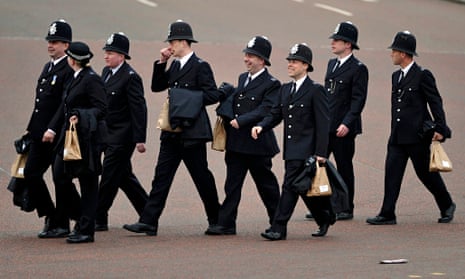One of the few MPs who stand up for freedom in Britain, the Conservative David Davis, suggested that although the police attempt to monitor sales of the special issue of Charlie Hebdo was disquieting, it was more stupid than sinister. On this occasion I find it hard to agree with him. It is clear from a number of recent developments that the police have lost an understanding of what it means to live in a free society, and indeed how the police fit into that society and guard its freedoms.
The publication of the special survivors’ issue of Charlie Hebdo was an act that defied the murderous attack on free speech in Paris last month, and it is a grim irony that police officers in three areas of the country, using the vague pretext of heightened tensions between communities, saw this as an excuse to try to collect names of legitimate readers.
It is also clear that these were not the actions of a few overzealous officers, although Wiltshire police have apologised for the approach made by one officer. Clearly some kind of alert was sent out from central government, for only that can explain why Cheshire constabulary and Dyfed-Powys police also approached newsagents over the sale of the magazine. Neither police force has apologised.
Even if there was no such alert, the action does not speak well of the police, for this is the latest in a long line of developments that show a lack of respect for the freedoms we once took for granted, the most recent of which is the revelation that the images of hundreds of thousands of innocent people, not charged or convicted of any crime, were loaded on police databases for use of facial recognition CCTV. And this was despite a court ruling in 2012 that held that it was an unjustified intervention in the private lives of two plaintiffs. The response of the Home Office, truly a department that runs with its own agenda in these matters, was to do nothing.
There is no escaping the fact that the British police has scant regard for the rights of innocent people. Since the police started collecting the DNA of people not charged or convicted of a crime 10 years ago – a practice now illegal – there have been numerous occasions on which they have been revealed to be gathering people’s data and images without consent.
In Birmingham they used CCTV to spy on the Muslim community. Under the Blair and Brown administrations, the police built a large database of photographs of those legitimately attending demonstrations. In the past few days, the interception commissioner has reported that over a three-year period 82 journalists had their communications data acquired by police using the Regulation of Investigatory Powers Act (Ripa). Let me just underline that these were legitimate journalists working for mainstream titles in a country where a free press ensures accountability in a democratic system.
There is absolutely no excuse for monitoring the calls of the Sun’s political editor, Tom Newton Dunn, or those journalists working for the Mail on Sunday and the Ipswich Star who were pursuing entirely legitimate stories and were within the law. They all now seek redress in the courts. It is significant that the Press Gazette reported last month that every police force in the country rejected Freedom of Information requests about the use of Ripa against journalists. No wonder: the Home Office states “communications data is not subject to any professional privilege”. What about doctors, lawyers and, indeed, MPs?
The point is that while we are becoming a safer, more law-abiding society (the crime rate was down 15% last year, its lowest level in 33 years), the police push for ever more intrusive and oppressive powers. The recent demand that every police office on the streets should be allowed to carry a Taser stun gun is one example.
At the same time, police have their own problems. A recent Home Office report suggested that there was a lack of accountability as well as a significant corruption problem, with up to 2,000 officers likely to bend the rules and break the law. Are we happy to allow police officers, – who of course may not be working within the law themselves – free run of our reading habits, access to journalists’ communications, the power to track innocent people via facial recognition technologies and the right to build databases of people expressing their political convictions? If we value our freedoms, the answer must be no. It is time to re-educate the police on their place in a free society and put an end to the pervasive attitudes of suspicion and entitlement that the Charlie Hebdo story reveals.

